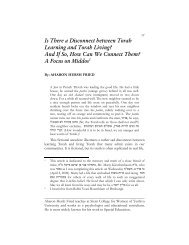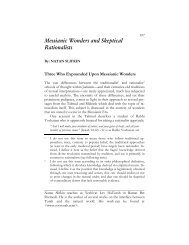A Discussion with Rabbi Shmuel Kamenetsky on âSSAâ - Hakirah.org
A Discussion with Rabbi Shmuel Kamenetsky on âSSAâ - Hakirah.org
A Discussion with Rabbi Shmuel Kamenetsky on âSSAâ - Hakirah.org
Create successful ePaper yourself
Turn your PDF publications into a flip-book with our unique Google optimized e-Paper software.
A <str<strong>on</strong>g>Discussi<strong>on</strong></str<strong>on</strong>g> <str<strong>on</strong>g>with</str<strong>on</strong>g> <str<strong>on</strong>g>Rabbi</str<strong>on</strong>g> <str<strong>on</strong>g>Shmuel</str<strong>on</strong>g> <str<strong>on</strong>g>Kamenetsky</str<strong>on</strong>g> <strong>on</strong> “SSA” : 39may then manifest itself in a desire to c<strong>on</strong>nect <str<strong>on</strong>g>with</str<strong>on</strong>g> those of thesame gender in an inappropriate sexualized way. 12Every<strong>on</strong>e Is Capable of Healing from Unwanted SSA“When it comes to homosexuality, from a Torah perspective there isno other opti<strong>on</strong> other than working at overcoming.” (<str<strong>on</strong>g>Rabbi</str<strong>on</strong>g> <str<strong>on</strong>g>Shmuel</str<strong>on</strong>g><str<strong>on</strong>g>Kamenetsky</str<strong>on</strong>g>)What about individuals who claim that they have sincerely tried toheal but were not able to?Not every<strong>on</strong>e succeeds in his/her current therapy, but as theRosh Yeshiva previously stated, “every<strong>on</strong>e is capable of healing.” 13And, since there are many modalities of therapy, it should be obviousthat what works for <strong>on</strong>e individual may not work for another.There are many different forms of therapeutic assistance that canhelp people overcome their same-sex attracti<strong>on</strong>. 14 The pers<strong>on</strong> involvedmay not have chosen a therapeutic modality that “reaches”him/her or, alternatively, may not yet be in the right space toachieve his/her goal. For some, it requires hitting rock bottom tobe in that space. For others, they may not yet have been in thespace that enabled them to release certain blocks. This is not aboutblame in any way, but rather an explanati<strong>on</strong> of the reality whysome people succeed and some d<strong>on</strong>’t. The fact that a pers<strong>on</strong> has not121314Mental-health professi<strong>on</strong>als that accept sexual orientati<strong>on</strong> change modelsbelieve that the wounds may include homo-emoti<strong>on</strong>al wounds (such asdefensive detachment from the father figure), hetero-emoti<strong>on</strong>al wounds(such as those from the mother figure), social or peer wounds, siblingwounds and other family dynamics, body-image wounds, temperament,sexual abuse, cultural wounds, gender double-binds, and other factors.The Torah requires us to exert c<strong>on</strong>tinuous effort toward growth and healing.Half measures are insufficient. According to the Rosh Yeshiva, preventing<strong>on</strong>eself from sinning by simply c<strong>on</strong>trolling <strong>on</strong>e’s behavior ismerely the first step of the process.Examples include but are not limited to several mainstream approachessuch as: psychoanalysis, psychodynamic models, integrative approaches,cognitive-behavioral treatment, affective therapy, eye movement desensitizati<strong>on</strong>and reprocessing, interpers<strong>on</strong>al therapy, object relati<strong>on</strong>s therapy,family counseling and pastoral approaches.
















